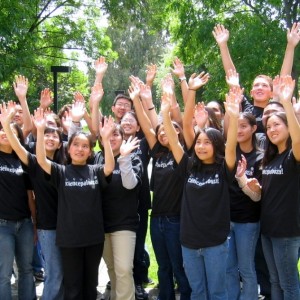
It used to be easy to tell myself that I could do everything alone. That was the way I had mostly done things until college, and I never felt the need to change. It was no different when I began research at Princeton. It was easy to convince myself to not to ask questions, to simply turn to books or articles for help, for fear of pestering and disappointing my adviser and my labmates. As long as I kept my head down and worked, I believed I would know what was happening eventually.
But I don’t tell myself that anymore. In fact, it frustrates me when I look back a year ago to that time. I’m only now filling in the gaps of my incomplete knowledge, a problem that would easily have been solved had I had the audacity to speak up and ask the questions that really mattered. I was just unsure and afraid about what I was expected to know – and somehow, I translated that into the fact that I was somehow expected to know everything. Because of that fear, I ended up neglecting my greatest resources, my greatest friends – my adviser, my labmates, my peers.
When I began on the path of independent research sophomore year, I barely knew what I was doing. I knew even less about where I might be headed. I only knew that I liked doing hands-on work more than I liked sitting in lecture listening to the professor speak, and I wanted to try out working in the lab rather than working on problem sets – but what exactly that lab work entailed, I wasn’t so sure. The one hint I had to go off of was my bit of experience with spectroscopy and trace gas sensing in the summer. Eager to circumvent the steep learning curve I knew I would undoubtedly face, decided to join a lab in a research field as close as possible to the work I had been doing.
But try as I might, that didn’t make the transition much better. The first group meeting I attended, my hand nearly fell off from scribbling down notes about everything I didn’t know and wanted to check up later. Whereas I had worked with one particular kind of sensing technique, now were three different kinds of techniques I had never heard of with their own separate nuances. When I began to learn about the sensor I would soon work with, my head spun from the equations and convoluted theory that lay behind in a realm of physics that I had never quite touched.
Nevertheless, I buried my concerns, as I didn’t want to bother and nag the others with my endless questions. If at the group meeting I asked about every single little thing, there would be no end to the amount of explaining that someone would have to do for my sake. I deduced that there was some lower boundary of my knowledge, and I was determined to use scientific papers to stuff that gap, swallowing the words the scientific papers and Wikipedia articles online fed me, telling myself I would pick it up as I went.
And indeed, I learned to work with the sensor, to interpret the graphs, but somewhere inside, that little gap of knowledge was never filled. Somewhere inside, there was a hole buried under all of those words, such that the moment someone asked me about all the equations, asked me about the basic physical processes, everything would come crashing down. And that is precisely what happened.
Naturally, there is a fine line to traverse between asking too many questions and asking just what you need to ask. But that doesn’t mean that you should let that stand in the way of your basic understanding of something. That certainly doesn’t mean you shouldn’t ask any questions. If you’re working with a grad student or two, more than likely they’d be happy to explain any confusions you have. If you have any questions about the project, your adviser would probably be happy to sit down with you and point you in the right direction.
And so, if you ever have any confusions, you should be to be sure to leverage all the resources and people around you. Even though it’s called “independent work”, doing research doesn’t ever mean that you’re working alone.
— Stacey Huang, Engineering Correspondent

